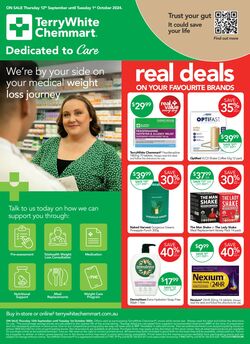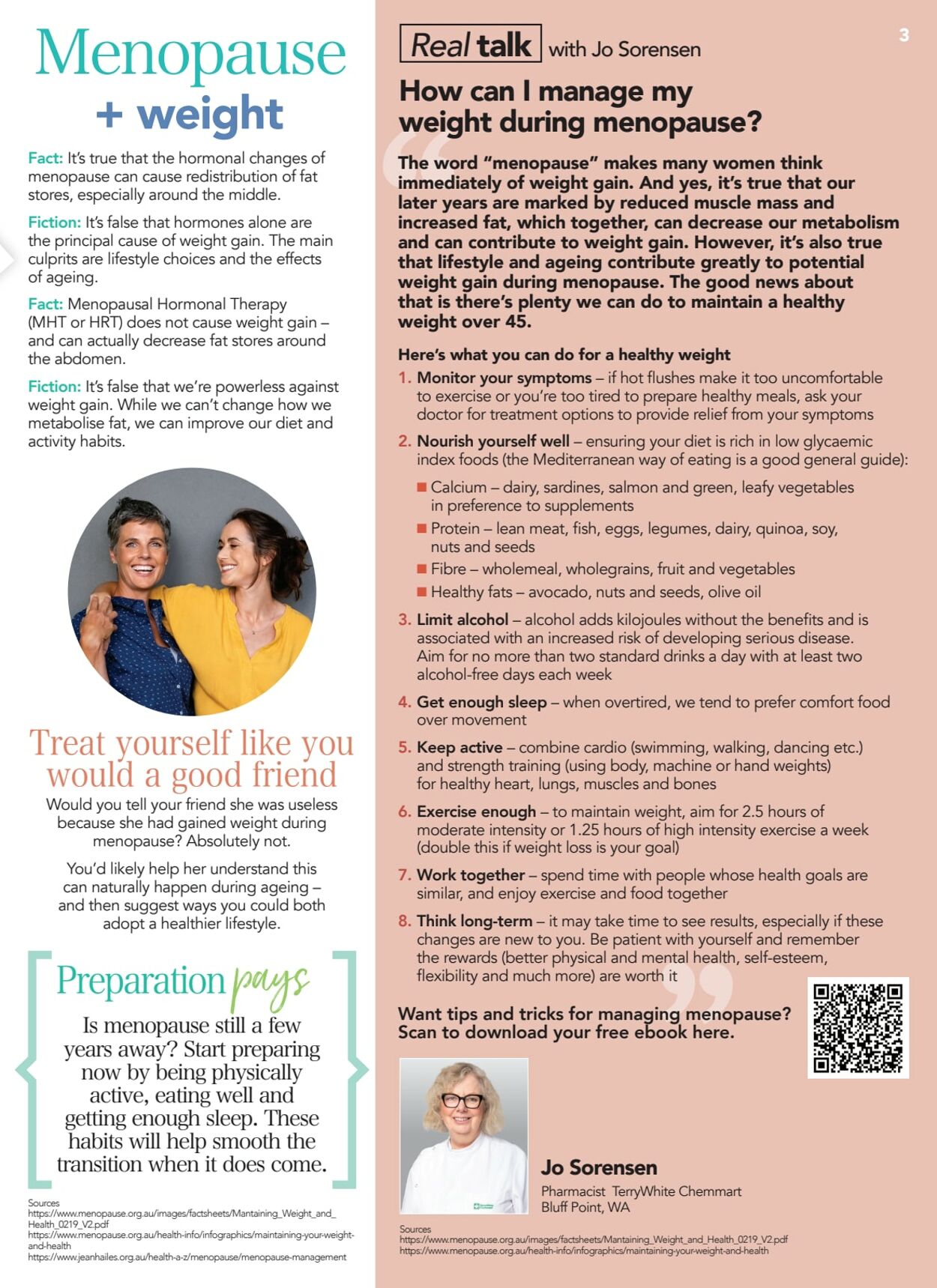













Products in this catalogue
Menopause + weight Fact: It's true that the hormonal changes of menopause can cause redistribution of fat stores, especially around the middle. Fiction: It's false that hormones alone are the principal cause of weight gain. The main culprits are lifestyle choices and the effects of ageing. Fact: Menopausal Hormonal Therapy (MHT or HRT) does not cause weight gain — and can actually decrease fat stores around the abdomen. Fiction: It's false that we're powerless against weight gain. While we can’t change how we metabolise fat, we can improve our diet and activity habits. Treat yourself like you would a good friend Would you tell your friend she was useless because she had gained weight during menopause? Absolutely not. You'd likely help her understand this can naturally happen during ageing — and then suggest ways you could both adopt a healthier lifestyle. Preparation pugs Is menopause still a few years away? Start preparing now by being physically active, eating well and getting enough sleep. These habits will help smooth the transition when it does come. Sources hitps//wm.menopause org.au/images/factsheets/Mantaining Weight and_ Health_0219_V2pdF https//wa.menopause org au/healthvinfo/infographics/maintaining-yourweight- and-heatth https://wujeanheiles.org au/health-a-2/menopeuse/menopause-management Real talk | with Jo Sorensen How can I manage my weight during menopause? The word “menopause” makes many women think immediately of weight gain. And yes, it’s true that our later years are marked by reduced muscle mass and increased fat, which together, can decrease our metabolism and can contribute to weight gain. However, it’s also true that lifestyle and ageing contribute greatly to potential weight gain during menopause. The good news about that is there’s plenty we can do to maintain a healthy weight over 45. Here's what you can do for a healthy weight 1. Monitor your symptoms - if hot flushes make it too uncomfortable to exercise or you're too tired to prepare healthy meals, ask your doctor for treatment options to provide relief from your symptoms 2. Nourish yourself well — ensuring your diet is rich in low glycaemic index foods (the Mediterranean way of eating is a good general guide): ™ Calcium — dairy, sardines, salmon and green, leafy vegetables in preference to supplements ™ Protein — lean meat, fish, eggs, legumes, dairy, quinoa, soy, nuts and seeds &§ Fibre — wholemeal, wholegrains, fruit and vegetables ™ Healthy fats — avocado, nuts and seeds, olive oil 3. Limit alcohol — alcohol adds kilojoules without the benefits and is associated with an increased risk of developing serious disease. Aim for no more than two standard drinks a day with at least two alcohol-free days each week 4. Get enough sleep — when overtired, we tend to prefer comfort food over movement 5. Keep active — combine cardio (swimming, walking, dancing etc.) and strength training (using body, machine or hand weights) for healthy heart, lungs, muscles and bones 6. Exercise enough — to maintain weight, aim for 2.5 hours of moderate intensity or 1.25 hours of high intensity exercise a week (double this if weight loss is your goal) 7. Work together — spend time with people whose health goals are similar, and enjoy exercise and food together 8. Think long-term — it may take time to see results, especially if these changes are new to you. Be patient with yourself and remember the rewards (better physical and mental health, self-esteem, flexibility and much more) are worth it Want tips and tricks for mene aee menopause? Scan to download your free ebook here. Jo Sorensen | Pharmacist TerryWhite Chemmart om 7 Bluff Point, WA ‘https/wwwumenopause.org.au/images/factsheets/Mantaining_Weight_and_Health_0219_V2.pdf bhtips/Awwmenopeuse org au/health.nfo/infographics/maintaining yourweight-anct-health
| Name | Details |
|---|